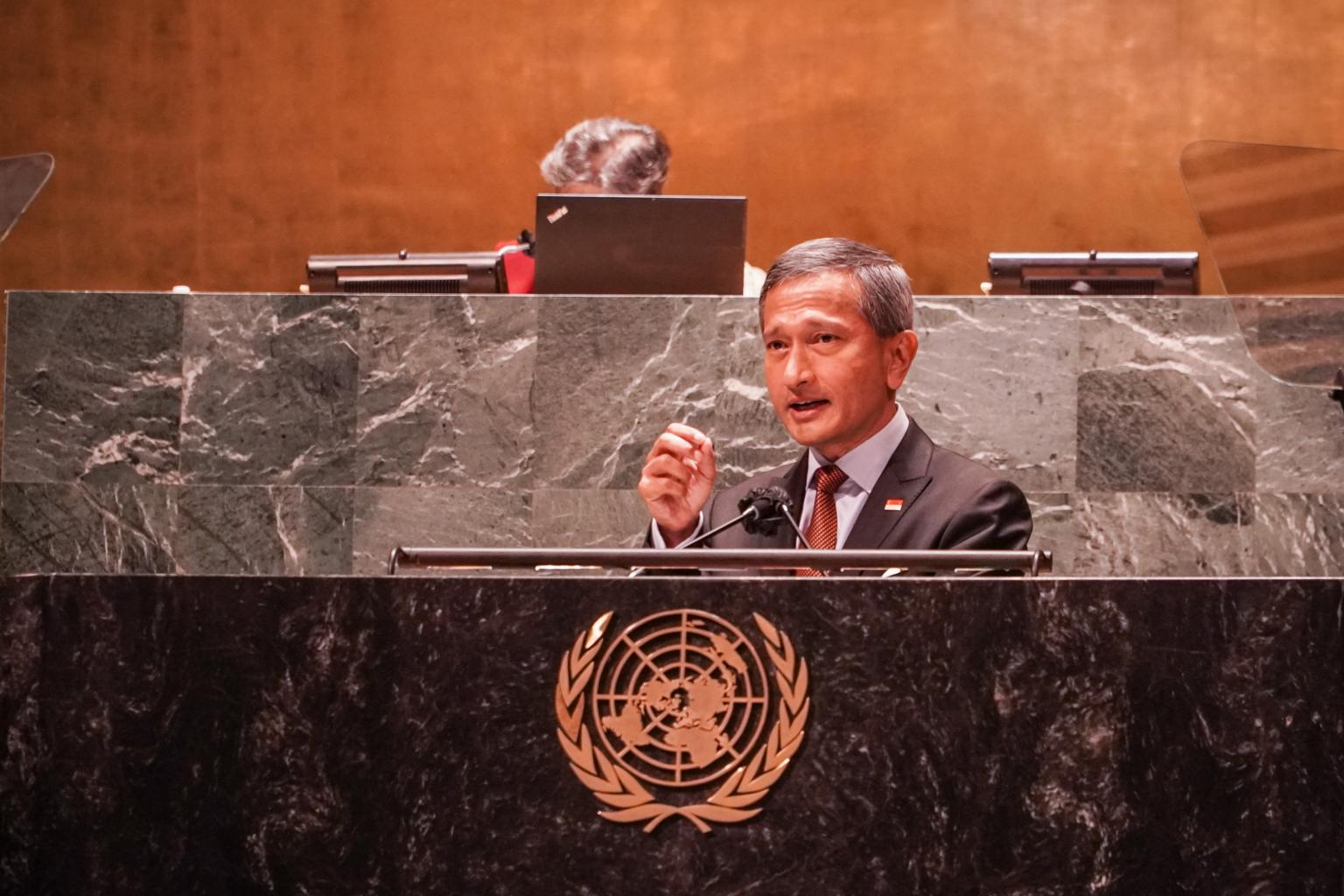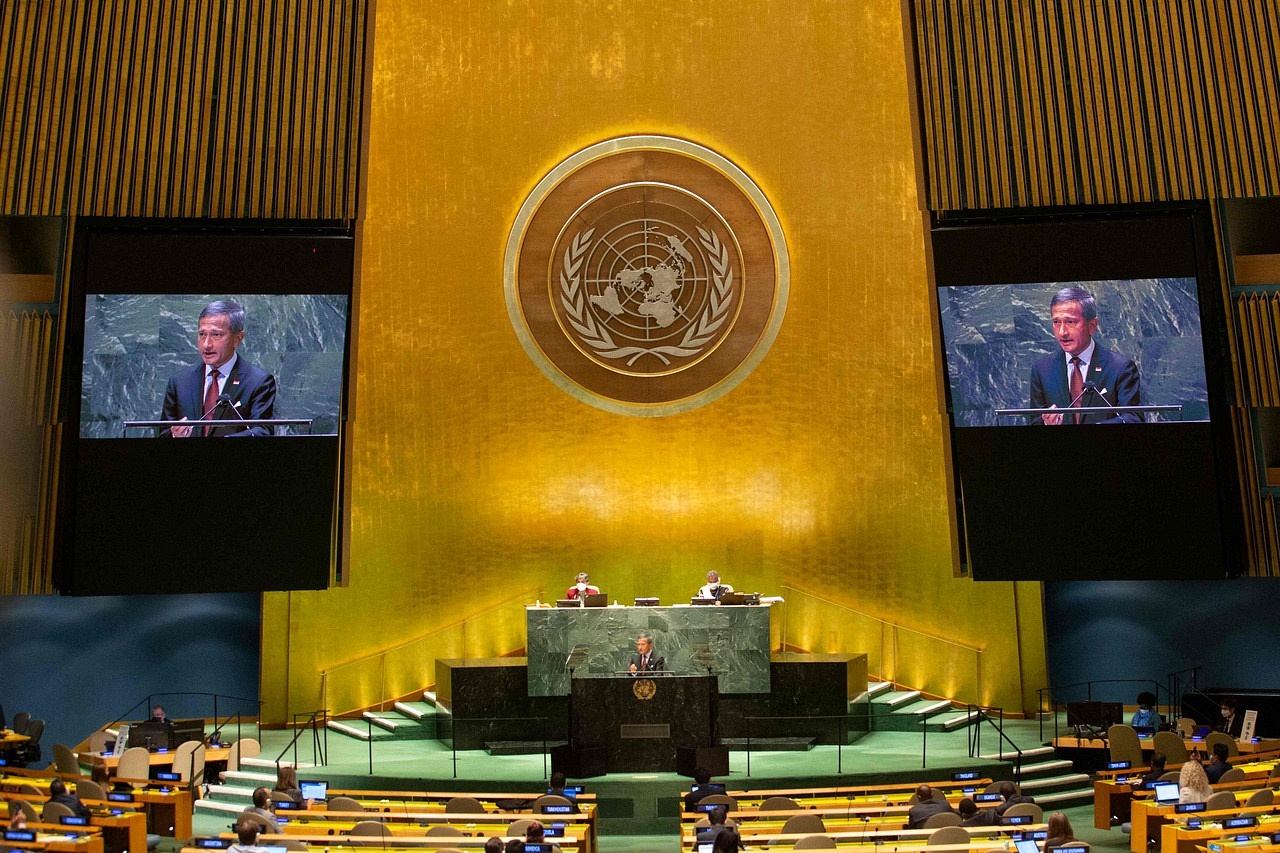UN General Assembly: Vivian Balakrishnan urges urgent multilateral action to address digital divide
Sign up now: Get ST's newsletters delivered to your inbox

Foreign Minister Vivian Balakrishnan addressing the UN General Assembly in New York on Sept 25, 2021.
PHOTO: MINISTRY OF FOREIGN AFFAIRS
Follow topic:
WASHINGTON - Singapore's Minister of Foreign Affairs, Dr Vivian Balakrishnan, on Saturday (Sept 25) urged nations at the UN General Assembly to identify a common set of "digital development goals" to address a wide digital divide that has left 3.8 billion people in the world still digitally disconnected.
The digital revolution and three other key areas - public health, climate change and oceans - require the urgent attention of the international community, the minister said.
Digital transformation must fundamentally be about improving lives and empowering people, especially the poorest and the most vulnerable, Dr Balakrishnan said in his statement to the United Nations assembly late on Saturday afternoon in New York.
The pandemic has accelerated the pace and scale of the ongoing digital revolution, he added.
"If we do not close the digital divide, we will not achieve the SDGs," Dr Balakrishnan warned, referring to "sustainable development goals", a set of targets adopted by the United Nations in 2015 that broadly represents a universal call to action to end poverty, protect the planet and ensure that all people enjoy peace and prosperity by 2030.
"This is why digitalisation poses a global challenge and requires a concerted global response."
Issues involved in meeting these goals include addressing misinformation, leveraging on digital technologies to promote innovation and sustained development, and fair and secure access to data - ensuring that data is "not monopolised by a few... leaving the vast majority digitally disenfranchised", the minister said.
"There's a lot of focus on the digital divide," Dr Balakrishnan told the Singapore media later in a virtual interview from New York. "And in the midst of this pandemic, the lack of connectivity means a lot of parts of the world are deprived of access to education, to healthcare, to essential information (and) jobs and job prospects."
The international community needs to have a conversation about a "framework of norms and principles", and the voices of small states must also be heard. Digital transformation needs to be people-focused, must include people's daily lives, and involve all relevant stakeholders, he added.
He also announced that Singapore will run programmes from next year to help small states with digital transformation and Covid-19 recovery, under an initiative called Foss for Good. Foss is the Forum of Small States, an informal grouping that Singapore set up in 1992 and currently has 108 members.
On the public health front, access to vaccines to combat Covid-19 is the biggest problem faced by many countries, Dr Balakrishnan said, urging the scale-up of global production and distribution of the shots.
Singapore will do its part by donating under the Covax initiative to other countries with greater needs, he said.
"Some time next year onwards, you will see the construction of facilities by BioNTech, Sanofi and Thermo Fisher, so that there will be indigenous vaccine production in Singapore," the minister said. "Because we are a very small market... those facilities will be designed to produce and make available vaccines to a much wider neighbourhood. So this is the way Singapore will be a constructive, helpful and reliable partner."
He also called for the strengthening of multilateral support for the World Health Organisation (WHO) and the UN, and to mobilise resources for collective security because "no one is safe until everyone is safe".
On climate change, the international community needs a sustained and ambitious global response, the minister said.
Climate change presents a "clear and present danger" for a small island state like Singapore, he said, and its effects, while felt at the local level, require solutions at a global level.
"The fight against climate change will be a stark litmus test of our ability to manage the global commons through multilateral action" Dr Balakrishnan said. "If we work together we can make a substantial impact. If we fail the consequences will be calamitous for every country and for all humanity."
Oceans are also global issue in urgent need of multilateral action.
The 40th anniversary of the adoption of the UN Convention on the Law of the Sea (Unclos) is an opportunity to reaffirm commitment to UNCLOS as the primary legal instrument for governance of the oceans, he added.
Asked about US-China relations, Dr Balakrishnan remarked that both US President Joe Biden and China's President Xi Jinping - who addressed the UNGA virtually - had given "careful" speeches.
Mr Biden said "we must be careful not to tip from responsible competition into conflict", while Mr Xi said one country's success does not mean another's failure.
"Having said that, we're still at the very early stages of this strategic rebalancing, readjustment, recalibration of the relationship, and you cannot assume that things will always be smooth sailing and nothing will go wrong," Dr Balakrishnan said.
"This is something everyone is aware of. If there is real trouble between the two superpowers, we are all going to be affected, and affected severely."
The minister said the "real strategic question" remains how the US and China will manage this realignment and rebalancing of their relationship.

Foreign Minister Vivian Balakrishnan addressing the UN General Assembly in New York on Sept 25, 2021.
PHOTO: POOL
"On our part… we believe in multilateralism (and) a rules-based world order. We continue to believe that trade, investments, common standards (and) level playing fields… are the formulae for peace and prosperity in the long term," he said.
"After all that is the raison d'etre of the United Nations. The more we can get into the habit of solving problems collectively... the better for all of us."
On Aukus, the new security pact binding the United States, Britain and Australia in a high-tech defence partnership, Dr Balakrishnan said that the fact that Singapore has a longstanding constructive relationship with all three countries built on trust meant that Singapore was not unduly anxious over the matter.
"We hope these new arrangements will contribute constructively to peace and stability. And we hope these arrangements will also complement the regional architecture which has Asean at its centre," he said.
The key point to understand is that this is part of a larger geostrategic realignment and "we have to take these things in our stride, we need to understand the primary forces acting on these tectonic plates... and in the case of Singapore, be very, very careful we do not end up in a position which is unviable or dangerous," Dr Balakrishnan said.
But the fact that Singapore was friends with everyone means that "we are able to speak honestly and constructively".
"That also gives us a slightly unique role in engaging in a constructive conversation," he said.

